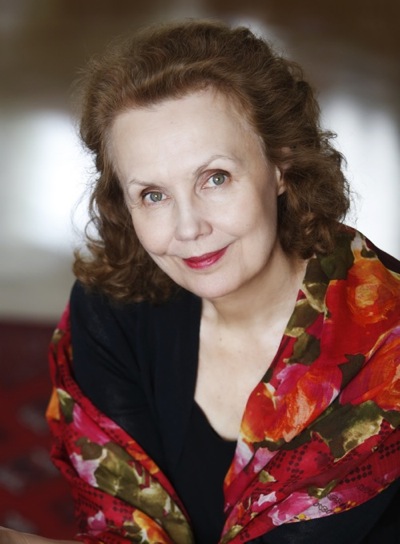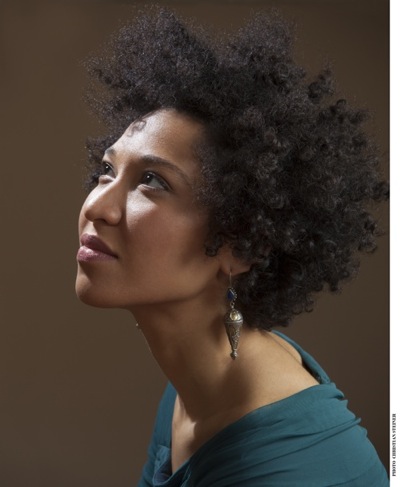Women’s voices and difficult choices at Cal Festival.
This year’s Ojai at Berkeley festival, a shorter version of the recent Ojai music festival in Southern California, took place at UC Berkeley
 over three evenings this past weekend, June 16 – 18. What is most unusual about this long-running festival is the rotating artisticdirectorship, which ensures an ever-lively approach to programming.
over three evenings this past weekend, June 16 – 18. What is most unusual about this long-running festival is the rotating artisticdirectorship, which ensures an ever-lively approach to programming.
This year’s director was the exuberant Peter Sellars, with a thoughtful festival that explored music by and about women, although that was understated. Each of the programs had layers that spoke of the difficult line that women artists have to walk, a balance beam at the heart of society.
On Friday, musicians from the International Contemporary Ensemble (ICE), singers from Roomful of Teeth, and Soprano Julia Bullock joined forces for La Passion de Simone by Finnish composer Kaija Saariaho. This opera, a series of poetic musings on the journey and death of philosopher Simone Weil, was a reduction for chamber orchestra from Saariaho’s original version, which debuted in 2006.
The work was organized into fifteen stanzas with texts by poet Amin Maalouf, and its “stations” (as in, the “stations of the cross”) are meant to represent Weil’s religious evolution and apotheosis.
The music began with long trombone notes silvered with harp and metallic percussion, an atmosphere of dawn and expectancy and dread. “I resent that you preferred death,” Bullock sang, referring to how Weil slowly starved herself to death as news filtered into France on the horror of the concentration camps. Her big intervals and small sighs floated over the orchestra’s tight dissonances. “One day, you stopped eating,” she later sang, “Because the children of France Were deprived of milk… One day, you gave up life, because the world had ceased to live In dignity.”
The third station spoke of the power of attention, and here the chamber orchestra turned almost feral, the graceful voice of wild animals. Their music ranged from swampy to sudden brass volleys, and from note bending to fierce breaths. ICE built to a strident pounding and then delivered us into Bullock’s soft whispers about silence.
Among the stations, there were hollow punctuations of wood and sharp brake drum, painting a factory floor. And there were gorgeous passages when English horn and low voice twined around each other, as Bullock sang, “Two forces rule the universe… light and gravity,” and it was clear that they were faces of each other. The four singers from Roomful of Teeth blended in tight dissonances that were so perfectly balanced it created an unworldly beauty.
 But much of Saariaho’s musical language is esoteric, unexpected and Spectralist, an unabashed and difficult purity that is an apt fit for Weil’s solitary path and thoughts on grace and gravity.
But much of Saariaho’s musical language is esoteric, unexpected and Spectralist, an unabashed and difficult purity that is an apt fit for Weil’s solitary path and thoughts on grace and gravity.
Maalouf’s language, though beautiful, describes her bitter journey into denial, but that bitterness was only one side of a courageous woman who wrestled with faith and lost that fight at the age of 34. She also wrote, “Love is not consolation, it is light,” and “Beauty captivates flesh in order to obtain permission to pass into the soul.”
And then celebrating another balance beam…
That evening’s astringent power was a curious prelude to the next night, when a young Egyptian singer/songwriter delivered ancient scales and modern rock in a program titled, “The Sounds of Tahrir Square, Cairo.” Dina El Wedidi brought her band to Zellerbach Hall, setting eclectic musical sources to poetry that was occasionally direct and often shrouded in metaphors. Jazz saxophone, accordion, and dumbek joined forces with electric guitar, keyboard and El Wedidi’s throaty vowels.
One sensed that Wedidi, who began her career as a linguist, was searching for ways to speak across a difficult divide, words that would bridge the hopes of the young and the fears of the fundamentalists. In an ancient and liquid voice like the ululating call to prayer of a muezzin, she sang:
“Singing is not a sin, Love is not a sin, Art is not a sin… Sin is the words, half of which are lies.”
Describing her music as New Egyptian Folk and Arab Fusion, El Wedidi’s songs spoke in universals, a language of joy, urgency and mourning. In the midst of dense electronic timbres and a driving beat, her voice was glottal and adorned with melismas, held motionless without need of vibrato.
She was accompanied by Wael El Sayed on accordion – and it was curious to hear how the normally Western instrument was tuned to different pitches – adding an exotic nasal sound not unlike the oboe. Two percussionists added a backbone that ranged from driving rock to exhilarating Afro-Cuban and visceral Arabic seven-eight rhythms: Abdelazim Barhouma used a snare and high hat drum kit, and Muhammed Raafet played an assortment of traditional drums, primarily dumbek and frame-drum. Three of El Wedidi’s band mates were denied visas, but she was able to arrange for a sax player from Boston, Gabriel Birnbaum, who not only played jazz solos but added his instrument seamlessly to the Middle Eastern sound of the ensemble. And Ahmad El Haggar, also from Boston, joined her in one vocal duet along with playing the keyboard and oud.
Though commanding huge popularity in Egypt, Dina El Wedidi is still treading a dangerous path, looking for truth as an artist and as a woman in a perilous time. In that, she is sister to Simone Weil… and Saariaho and Bullock.
—Adam Broner
Photos, from top: composer Kaija Saariaho and singer/songwriter Dina El Wedidi, by permission; and soprano Julia Bullock, photo by Christian Steiner.
